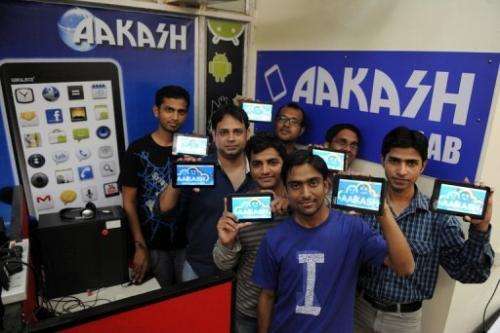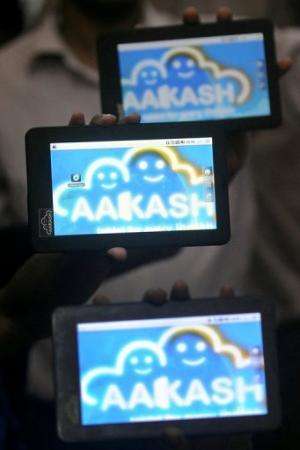India unveils new version of 'world's cheapest tablet' (Update)

India has launched a new version of what is dubbed the world's cheapest computer—on sale to students at the subsidised price of $20—with a quicker processor and an improved battery.
The Aakash tablet has been developed as a public-private partnership aimed at making computing technology available to students in a country where only one in ten uses the Internet.
Makers of the tablet, Britain-based Datawind, say the Aakash 2 is powered by a processor that runs three times faster than the original. It also has a bigger touch screen and a battery with a life of three hours.
Company CEO Suneet Singh Tuli said glitches in the first version have been removed in the latest model, which runs on Google's Android operating system.
"This time we have done our homework and all the problems which were found in Aakash-1 have been dealt with," Tuli told AFP.
"We are much more confident about Aakash 2 because the hardware is different and the applications are also new... a change in the (design) team has made all the difference," the Datawind chief executive said.

The first version of the Aakash was launched by the government in October last year but it was marred by problems including a short battery life, initial long waiting lists and difficulties with distribution.
At the upgraded computer's launch on Sunday, Indian President Pranab Mukherjee stressed the importance of digital tools for students.
"Technology-enabled learning is a very important aspect of education," Mukherjee said.
"This must be adapted to our specific needs and introduced expeditiously in all educational institutions across the country."
The paperback-book-sized Aakash 2, developed by Indian engineers at elite public universities operated by the Indian Institute of Technology, has a screen measuring seven inches (18 centimetres).
"Unlike the previous version which was a non-starter, this time around there are some functions and features around the Android tablet which make it a decent computing device for that price," stated pluggd.in, an Indian website that analyses gadgets.
The first 100,000 devices will be sold to students at engineering colleges and universities at a subsidised price of 1,130 rupees (20 dollars). Subsequently Aakash 2 will be distributed to bookstores in Indian universities.
Datawind says the commercial sale price without subsidies for Aakash 2 is 3,500 rupees (64 dollars).
More than 15,000 teachers at 250 colleges have been trained in the use of Aakash for education, according to the human resource development ministry.
The country has nearly 115 million Internet users, the world's third-largest number after China and the United States, data from the Internet and Mobile Association of India shows.
But this only represents about 10 percent of the population.
(c) 2012 AFP



















